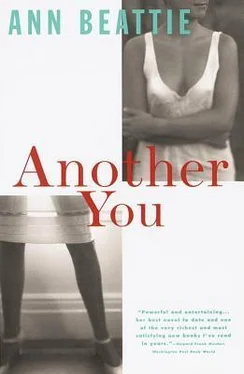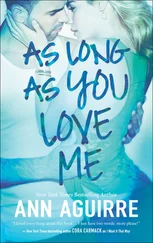Ann Beattie - Another You
Здесь есть возможность читать онлайн «Ann Beattie - Another You» весь текст электронной книги совершенно бесплатно (целиком полную версию без сокращений). В некоторых случаях можно слушать аудио, скачать через торрент в формате fb2 и присутствует краткое содержание. Год выпуска: 2014, Издательство: Vintage Books, Жанр: Современная проза, на английском языке. Описание произведения, (предисловие) а так же отзывы посетителей доступны на портале библиотеки ЛибКат.
- Название:Another You
- Автор:
- Издательство:Vintage Books
- Жанр:
- Год:2014
- ISBN:нет данных
- Рейтинг книги:5 / 5. Голосов: 1
-
Избранное:Добавить в избранное
- Отзывы:
-
Ваша оценка:
- 100
- 1
- 2
- 3
- 4
- 5
Another You: краткое содержание, описание и аннотация
Предлагаем к чтению аннотацию, описание, краткое содержание или предисловие (зависит от того, что написал сам автор книги «Another You»). Если вы не нашли необходимую информацию о книге — напишите в комментариях, мы постараемся отыскать её.
Another You — читать онлайн бесплатно полную книгу (весь текст) целиком
Ниже представлен текст книги, разбитый по страницам. Система сохранения места последней прочитанной страницы, позволяет с удобством читать онлайн бесплатно книгу «Another You», без необходимости каждый раз заново искать на чём Вы остановились. Поставьте закладку, и сможете в любой момент перейти на страницу, на которой закончили чтение.
Интервал:
Закладка:
Thinking about it now, that night when his mother had told them she was dying came into slightly clearer focus. By concentrating on what was happening outside — his father’s pacing; the wildly blowing trees — even at that moment he had seen something important in his peripheral vision: Evie, coming quietly to the doorway, checking on them, disappearing, anxious to see how this traumatic event was registering on the boys, as well as seeing if there was anything she could do for their mother. However clear it was that she loved the two of them, it was even clearer that she loved their mother. It was a little strange — he thought that, now — that he and Gordon had not been prepared for the news in any way. Gordon said later that he knew their mother was ill, but surely he hadn’t known she was terminally ill. Surely even Gordon must have been astonished, probably more than he, because he was older and could better comprehend what was being said. He could remember so clearly observing Gordon’s expressions that night, trying to take his cues from his older brother. He was still reluctant to focus on his mother, and on her words, so that sometimes when that scene came back to him it could as well have been a scene that omitted her: just scattered paperdolls, his father moving outside the house, Evie appearing and disappearing. He and Gordon had had a magnetic disk and two small Scottie dogs, one white and one black; the top Scottie moved forward on the disk when the other dog was upside down underneath, drawing it along by magnetic force. Evie had seemed like the visible Scottie, probably the black one because his mother, in her nightgown, had been so white … yes; he had thought that back then. He actually remembered his half-formed, subliminal thoughts, not a feeling.
The building was overheated, with floor grates inside the vestibule that sent an eye-watering blast of hot air into his face as the doors swung closed behind him. Exiting the building at the same time he was entering was his student Dominic Ruiz, who came to a Wile-E-Coyote-at-edge-of-cliff stop to extend his hand and to say how sorry he was that Marshall’s mother had died. Well, Evie might as well have been his mother, though he was surprised the department secretary had been so specific when she’d cancelled his class. “Everyone in my family is deceased except for my mother,” Dominic said, as if this sad bit of information might offer Marshall some perverse consolation. Deceased, instead of dead. So: the family consisted only of Mrs. Ruiz and her not-very-bright son, Dominic. This nice young man who was gripping his hand sincerely. Dominic Ruiz had on leg warmers and cutoff jeans, his dirty knees visible in the space between striped wool and denim, a navy-blue parka zipped half-closed over a T-shirt revealing the soufflé of Bart Simpson’s bright yellow hair. “Oh, man, I really feel for you,” Dominic Ruiz said, straining to see past the teacher who was now his obstacle between hallway and door. “One thing I feel, at least you did the right thing to go to the funeral. I didn’t go to my uncle’s funeral and now I feel very bad about that. Oh, man, this stuff is difficult.”
He nodded, clapped Dominic’s shoulder, and moved away. Kids and their ideas of profundities , he thought, yet he knew that at Dominic’s age he would have done no better. As Dominic ran out of the building a gust of wind swept through strong enough to cause a landslide of stacked newspapers in the corridor. He went to straighten the pile — if Dominic Ruiz could exhibit good manners, so could he. As he repositioned the papers he found himself looking at a photograph of Livan Baker. “D.E.A. Agent Arrested,” read the headline. He stared from the photograph to the headline, then from the headline to the photograph. “Levann Baker,” was written below it. So there it was: Livan Baker was a narc.
Instead of going into the department office, he went through the swinging doors, hoping no one else he’d be obliged to talk to would see him before he could get to his office and close the door and read this latest unfathomable piece of information. A stampede of six or seven students passed him, taking the stairs by twos and threes, screeching about a party they were on their way to, the girls in the lead, coats dragged, hats clasped in their hands, scarves trailing the ground. At what age did people start to actually wear their winter clothes? He looked down and saw a dropped glove, decided against giving chase to return it. The latest revelation about Livan Baker made him feel as if he’d taken a stomach blow; he also felt sure that he was going to feel even worse once he read the news story. He held the newspaper tightly rolled, feeling vaguely compromised by the presence of Livan Baker’s story, though why should that be? He put the key in the lock and turned it, closed the door quickly behind him. He did not turn on the light. He went to his desk in the fading light, unbuttoned his jacket, and sank into the chair, smoothing the newspaper on the desk in front of him.
Livan Baker, twenty-five, of Chicago, Illinois, was an undercover narcotics agent. He read two descriptions of her: one by someone described as “a friend in the sophomore class,” another from her landlord, who called her “irresponsible.” The landlord commented that two other students shared Livan Baker’s apartment, and that they paid their rent separately. Livan Baker’s was either late or, more recently, never paid.
It could not be confirmed by official sources that Livan Baker was a narc. However, a Benson student, a former student from the University of Rochester, identified Livan Baker as the person who had been at the police station the day his best friend was booked for dealing dope. Someone described as “a source close to President Llewellyn” who would not speak for attribution was quoted as saying, “Well, what do you think? That there are people working undercover on campus Dr. Llewellyn doesn’t know about?”
Caught driving on the wrong side of the road, DWI Failed Breathalyzer. Search of car revealed cocaine in glove compartment, small quantity of marijuana in briefcase in trunk.
McCallum, you really pick ’em. That, or you have the worst luck imaginable .
Removed from jail by order of FBI. Paperwork about processing her release listed as “Confidential.” Court date set. Nothing about him, nothing about McCallum, no mention of Cheryl Lanier or Timothy, the other roommate. No accusations of rape, no mention of anorexia, no quote from the bag lady at Boston Common. The car she had been driving was a white 1987 Cadillac Seville, registered in Chicago to LeRoi Franklin Brown, who could not be reached for comment. “Brown was her boyfriend,” the same sophomore was quoted as saying. “It’s hard to believe she was a narc, because, I mean, that’s so straight, and you knew right away the two of them were wild.”
Yes, the college president was quoted as saying; we have no choice but to accommodate the U.S. government if they suspect a drug problem on campus. It might be what he called “reasonable” to assume that from time to time there had been undercover work. “Of course they’re undercover — what else would they be?” A statement on Livan Baker: “You should not necessarily assume that I, or anyone else, would necessarily know an agent’s exact name.” (As opposed to what? An inexact name?) Any denial, concerning Livan Baker? “No comment.”
He read it again, and understood that Livan Baker, twenty-five, an undercover cop, had for whatever reason made the big mistake of calling attention to herself when she was drunk, had been caught by the local cops, found to have a stash of drugs, and then that she was sprung from jail by the FBI (nice of them; but what would they do?). This left unanswered many things, but what it did answer was any question anyone might have about her character. It would also either provide consolation to McCallum, showing him he’d been in over his head, or it would embarrass him because he had been such a fool, or it might even make him angry to think he’d been had in such a way. In any case, he felt sure that presenting McCallum with the paper would be better than taking him a bouquet of roses. What a terrific update McCallum was going to get, and how lucky he would feel that he hadn’t been dragged in deeper. What if Livan Baker had been picked up with him, in Boston, what if she’d been busted in his presence? Either a very good actress or truly crazy. Older than she’d said, with a boyfriend who drove a Cadillac, probably had a fur coat back in Chicago, forget the bargain basement stuff. Just another out-of-control or deeply cynical person who’d tried to play both sides against the middle. A good enough actress that she’d sucked in quite a few people — more than necessary to validate her version of herself as tortured, pitiful. It was clear that Cheryl Lanier should see the article, also. It would wise her up, teach the lesson that everything shouldn’t be taken at face value, show her that other people’s suffering was sometimes less, rather than more, than it seemed to be.
Читать дальшеИнтервал:
Закладка:
Похожие книги на «Another You»
Представляем Вашему вниманию похожие книги на «Another You» списком для выбора. Мы отобрали схожую по названию и смыслу литературу в надежде предоставить читателям больше вариантов отыскать новые, интересные, ещё непрочитанные произведения.
Обсуждение, отзывы о книге «Another You» и просто собственные мнения читателей. Оставьте ваши комментарии, напишите, что Вы думаете о произведении, его смысле или главных героях. Укажите что конкретно понравилось, а что нет, и почему Вы так считаете.












